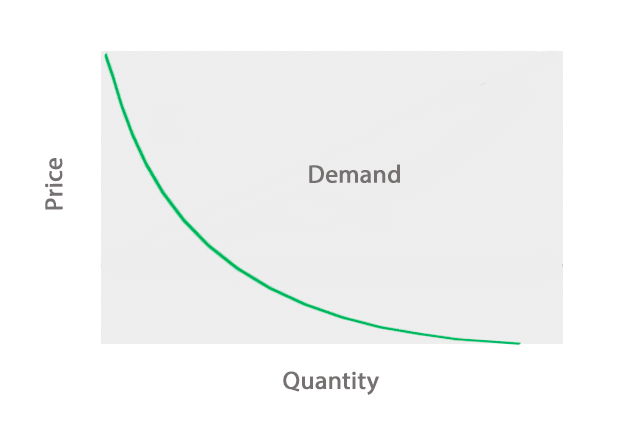Definition: The law of demand is a microeconomic concept that states that when the price of a product decreases, consumer demand for this particular product increases, provided that all other factors that affect consumer demand remain equal (ceteris paribus).
What Does Law of Demand Mean?
In the effort to maximize the utility of consumption, consumers base their purchasing decisions mainly on two factors: their income and the existence of similar products that may meet the same need (substitute products). Therefore, if the price of a product increases, consumers are expected to buy fewer units of this product, if their income is not sufficient to sustain the same quantity and if there is a substitute product that can satisfy their needs.
Here’s a graphical representation of the law of demand also known as the demand curve.

Let’s look at an example.
Example
John has decided to throw a party for his 30th birthday. According to his budget, he plans to spend $25 maximum on beef, so he goes to the supermarket and buys 4lbs. beef for $6.25 per lbs. A few days before the party, he goes to buy another 4lbs. of beef, but he realizes that the price of beef has increased to $7.41 per lb. So, now he would need $29.6 to buy his beef supplies. Will John spend more than $25?
The answer is no. John has set a budget of $25 for beef, so now he is looking for a substitute product to satisfy his need. Pork is a substitute product for beef and it costs $2.80 per lb., so 4 lbs. of pork would cost $11.2 instead of $25. John is actually saving $13.8, which he can spend on other supplies. Would John buy more beef, if the price had decreased?
The answer is yes. If the price of beef decreased to $5.55 per lbs., John would buy 4.5 lbs., instead of 4 lbs., for $25. So, the factors that determine John’s purchasing decision are his income ($25) and the existence of a substitute product (pork).
John is simply an example of the economy as a whole. As the prices of a good increase, the quantity demand for the product falls because consumers start to look for substitutes. The law of demand states that the opposite is true when the price decreases.


